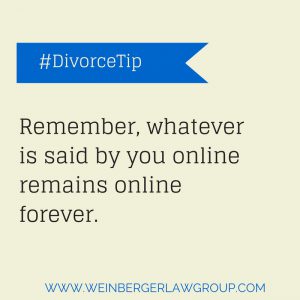Safeguarding Your Privacy in Divorce: Keeping it Offline
We have all seen gory details of peoples’ relationships plastered all over social media. We have witnessed arguments and name-calling on Facebook. Someone always knows someone whose divorce was made even more painful by later-regretted posts, pictures or even hijacked social media accounts. As tempting as it might be in the moment, it is never a good idea to hash out your personal problems or advertise the specifics of your divorce case in public.
So, how do you avoid publicizing your personal struggles with your spouse online?
Here are some tips for safeguarding your privacy during divorce:
Change all of your passwords: Once you separate from your spouse, there is no reason for him or her to have access to your social media accounts, if they had it while you were together. Leaving open access to your accounts, leaves you vulnerable to your spouse posting as if it were you.
Don’t engage online: Regardless of what your spouse may be saying about you on Facebook or Twitter, it is important that you are not baited into participating in a fight. Remember, whatever is said by you online remains online forever. And, your postings could be viewed by hundreds of people. Instead, talk to your divorce attorney about what is being said by your spouse and seek court intervention, if necessary.
Think about removing or blocking your spouse from your social media accounts: By removing access to you, you reduce the potential for your spouse to follow your day to day life on social media and also reduces the risk for spousal spying. The less your spouse knows about you once separated, the less they can speak about on their own Twitter or Facebook accounts.
Consider a “social media post-nuptial agreement”: More and more couples today are outlining not only how to split the house and the bank accounts, but how they are expected to behave in the event of a divorce. Agreements made after a couple is married are called post-nuptial or ante-nuptial agreements and can contain agreements such as having each party agree not to post on Facebook, tweet on Twitter, or otherwise share via social media site, any images or content that could be construed as negative, insulting, embarrassing, or unflattering. Some couples call for a complete blackout on posting photos of children or about the family business or other money and asset-related issues. In the event of a divorce, social media prenups might call for each spouse to refrain from posting anything — good or bad — on social media.
If your ex begins engaging in harassing or threatening behavior on Facebook or elsewhere, and you are in fear, investigate obtaining a temporary restraining order for your protection. And above all, resist the temptation to comment about your situation! Think about your children and what their friends and their friends families could see. Think about potential employers that may see your posts down the road. In the end, engaging in divorce warfare online is not productive and can be damaging to your children, your reputation and your future.
If you are considering divorce and are concerned regarding your privacy on social media, please contact us today to schedule your initial consultation with one of our qualified family attorneys who can advise you and assist you in exploring a social media post-nup.
Read More:




